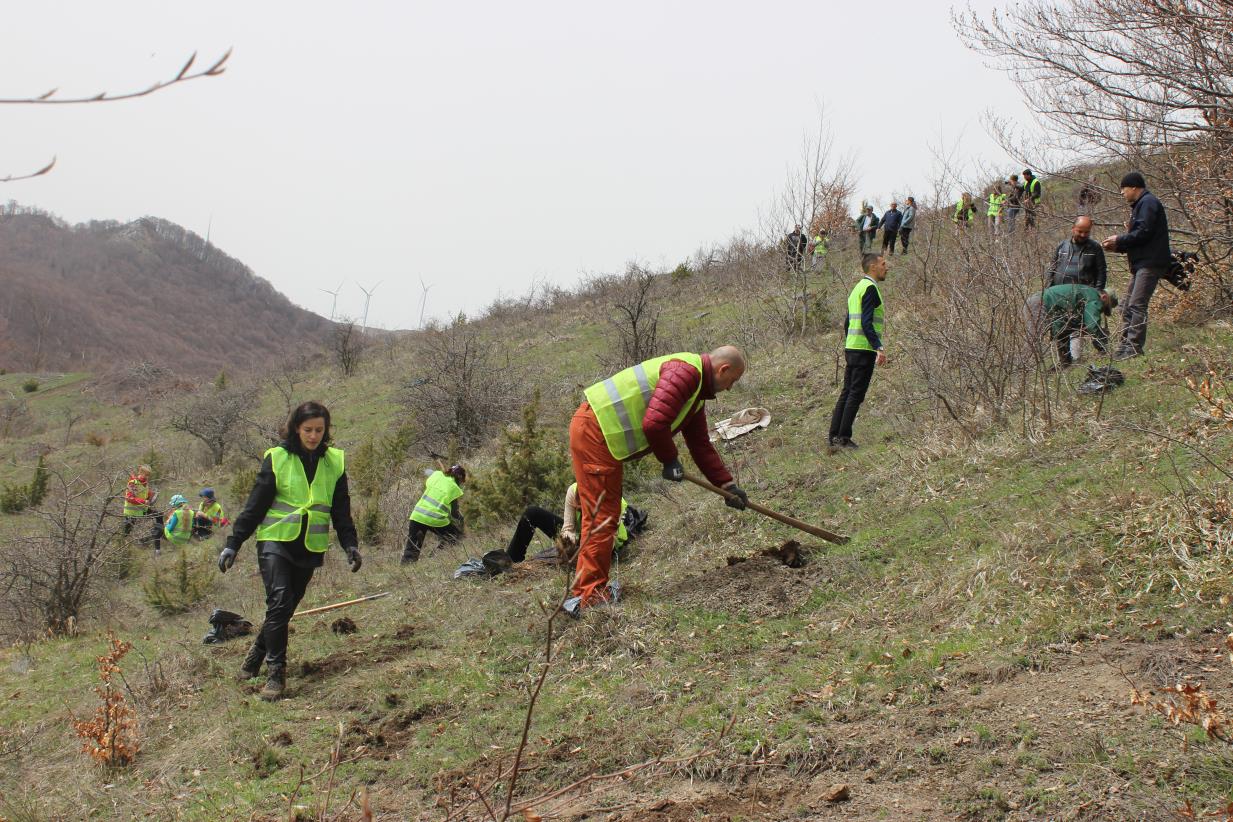
Communities benefit from planting and growing forests supported by FAO
©FAO
20/05/2022
It was one of those days when Ylvi Çengaj was working intensively in the village of Rrenc in the southern part of Kosovo1 to establish forests with native seedlings in an abandoned area.
Contracted as a casual worker along with dozens of others by a forestry programme of the Food and Agriculture Organization of the United Nations (FAO), he participated in planting 33 000 beech and spruce seedlings in the surrounding areas of his village in Dragash municipality.
“We are planting these trees for the future of our children,” Çengaj said. “Afforestation is very important to have cleaner air and to further develop tourism in this area.”
Looking after forests is one of Çengaj’s biggest concerns. His family uses wood for heating, as many other families in rural areas do. Çengaj and his fellow villagers are fully aware of the benefits of forests, and struggle to protect forests from illegal logging.
“We are planting these trees for the future of our children”
“Forests provide three major functions; social, economic, and ecological, so we must all be committed to conserving this resource that the Earth has given us,” said Muhamet Sofi, who is supervising afforestation activities by Çengaj and his co-workers in the Dragash area. “Here many areas are bare, thus, it is important to reforest them.”
Forests cover 44 percent of the total area of Kosovo, which is higher than in neighboring countries. Through a programme co-funded by the European Union and the Swedish International Development Cooperation Agency, FAO is supporting the Ministry of Agriculture, Forestry and Rural Development and the Kosovo Forest Agency in sustainable and multipurpose forest management for improved rural livelihoods and to address climate change. The programme aims to increase the forestry sector’s contribution to Kosovo’s economy through participatory and multi-purpose forest management.
In this regard, FAO is also supporting implementation of the “National Afforestation and Reforestation Programme” as a major programme to restore forest cover, with an emphasis on natively grown species, improve productivity, and reduce effects of climate change in Kosovo.


©FAO
Currently, forests are being established in Dragash and Shterpce/Strpce municipalities with help from the local community, including women and youth, ensuring that ultimately the entire community benefits from income generation through forest activities as well as improved biodiversity. This month, FAO completed the work of planting 50 hectares in total with about 140 000 seedlings, in addition to afforestation and reforestation activities implemented by the ministry and the Forest Agency.
“We have no other planet so we must protect it from potential damage and contribute to improving the situation," said Minister of Agriculture, Forestry and Rural Development Faton Peci during his visit to the planting areas. “With small actions, we can address climate change either through policies protecting biodiversity or regular afforestation actions.”

©FAO
Celebrating trees on Earth Day
On the occasion of Earth Day, FAO donated 10 000 trees for a voluntary planting in the village of Kacandoll in northern Kosovo.
The UN Development Coordinator, Ulrika Richardson welcomed the initiative, emphasizing that forests regulate ecosystems, sustain economies, and make people healthy and happy.
“Of course, this is a small grain, but we know that the ocean is made of small drops and a forest is made up by seedlings, so if we don’t start, we will never get to rebuild our forests,” said Richardson during the tree planting. “We are not very proud of the legacy that we are leaving for the younger generation, our children and grandchildren, and I think it is time to change this legacy.”
The planting was organized by the Local Climate Action Forum, in partnership with UN-Habitat Kosovo, Sustainability Leadership Kosovo, and the Municipality of Mitrovica South, and in cooperation with the Office of the President of Kosovo, the Ministry of Environment, Spatial Planning and Infrastructure, Ministry of Agriculture, Forestry and Rural Development, and the Parliamentary Committee on Environment, Food, Agriculture, Planning and Development.
1 All references to Kosovo should be understood to be in the context of United Nations Security Council resolution 1244 (1999).
Related links
Read more
- With forests, Kosovo is getting closer to sustainable, inclusive development
- In Armenia, FAO and its partners boost forestry efforts and climate action
- Joint FAO–UNECE sessions focus on future of European forests
- Eastern and Southeastern Europe commits to restore more than 4 million hectares of land by 2030
